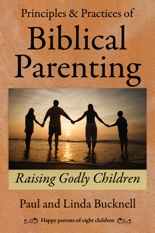
Take Your Next Step Into Ministry
Understanding God’s Training Program
for those in Ministry
Rev. Paul J. Bucknell
The Next Step | God's Goals | Starting Point | Learning from others
Pursuit of Christ | Experience | Evaluation | Spiritual | Training | Relationships
Pursuit of Christ | Experience | Evaluation | Spiritual | Training | Relationships
The Pursuit of Christ:
By Developing Character & Spiritual Disciplines
Purpose
Developing Character & Spiritual Disciplines is part of the Take Your Next Step into Ministry series that explains and helps a person seeking full-time service to acquire the moral character and proper spiritual disciplines needed for an effective ministry.
The Need for Character and Spiritual Disciplines for Ministry
Acquire and sustain the moral character and proper spiritual disciplines needed to nurture a close relationship with the Lord and to have an effective ministry.
“I am the vine, you are the branches; he who abides in Me, and I in him, he bears much fruit; for apart from Me you can do nothing” (John 15:5 - See the study).
A person can learn a lot about how to carry on different ministries but be totally unprepared in their personal and spiritual lives. Perhaps you have met some skilled people who have a poor marriage, worry, don’t seek the Lord in prayer or have an unresolved problem with lust. These personal flaws have and will be used of the evil one to ultimately destroy a person’s ministry.
Order your download of Take Your Next Step here! pdf and ePub!
The Bible speaks a lot about the personal growth of a Christian with little emphasis on skills. Much is said about being filled with the Holy Spirit and nothing of gaining a certain degree. This is, I believe, because without this personal moral foundation, the ministry has no meaning.
Character flaws reveal problems in our relationship with God and others. How sad to see ministries and missionaries with poor marriages, anger problems or relational difficulties with other missionaries. Their ministries are discredited by their lives.
These personal problems need to be rooted out by learning how to use God’s Word to conduct proper marriages, ministries and lives. (See my ‘Reaching Beyond Mediocrity’ book which includes many work pages to practically guide one when working them through.) These things can and should largely be worked out before going into ministry.
There is both the initial obtaining of a Christ-filled life and then the maintaining of it. We will focus on the first aspect of gaining moral character. Remember that our greatest task will be to discover problems that we did not think we had. We are often blind to our most needy areas. It is critical that we have an eager, humble heart to serve the Lord and allow Him to expose those areas.
Personal character development

In what areas of your life has God caused significant growth?
-
How has God helped you grow in those areas?
-
Name the three areas of character development that are most needed in your life.
-
Ask two or more good friends (including one’s spouse) areas where you need personal development.
Formulate a plan to work on each of them. Use a spiritual journal to keep track of your progress. Find a mentor in at least one area for increased development.
The Reaching Beyond Mediocrity book helps the believer effectively use God's Word to overcome many personal problems.
Intimacy with God
-
How much time do you spend with the Lord each day in prayer?
-
How much time do you think you should spend?
-
Do you look forward to your times with Him?
-
What level of priority is it that you meet the Lord each day? How do you know?
-
How do you respond when devotional times are not so exciting?
Bible knowledge is not the same as closeness with God. Prayer time can be religious and not profitable. Time spent is not the same thing as ‘good time spent.’ Without spiritual habits built into our lives before full-time ministry, we more than likely will not have them afterwards.
Many think that the Christian ministry allows for more personal time with God. The opposite is true. Many a busy missionary or pastor has been ‘burned out’ simply because they got too busy to meet with God.
Issues in marriage
The way we treat our spouse reflects our beliefs and relationship with the Lord. Marriage problems are significant and must be worked on.God has solutions. He wants a husband and wife to be intimate, joyful and peaceful. He doesn’t want them to argue but discuss and seek His face together.
-
On a scale of 1 to 10 (best), rate your marriage. Afterwards ask your spouse to do the same.
-
List any issues that you disagree upon. How do you solve these disagreements?
-
Do you burst out in anger to get your way?
-
If you have a quarrel, do you restore the relationship? Do you know how to restore the relationship? How long does it take you?
-
Do you tolerate bitterness or resentment in your heart toward each other? If so, you need to master forgiveness (this is the heart of the gospel – grace).

As a husband have you learned to devote yourself to caring for your wife? How do you know? Do you spiritually lead the home?
-
As a wife, have you learned how to submit to your husband or do you still resent his decisions?
-
Are you content with your spouse or think about how much better it would be to be married to another?
‘Building a Great Marriage’ is a great marriage resource with study questions for couples to work through.
Issues in single living
Marriage offers a special training place that singles do not have. If you are single, however, you can get a glimpse into your heart by noticing how you relate to your parents and roommates. A single person is tested by how he or she respects his parents or others in authority as well as in his or her relationships with others.
-
As a young person do you humble your will to do what your parents say? How do you respond to them when you disagree with them? Can you trust God with their judgments?
-
As a single do you properly honor your parents?
-
Have you worked through your singleness with God? Are you content with what God provides?
-
Do you get a little resentful when you see young couples or families with little children?
-
Have you learned to control your sexual desires?
Parenting
Many parents do not believe that they can raise godly children with proper attitudes. They allow modern techniques to substitute for biblical instructions. Note how an elder must keep “his children under control with all dignity” (1 Timothy 3:4).
The key to an effective family ministry, both in terms with time and witness, is to train your children to obey as God instructs us.
-
Do your children obey you? (How many times do you have to tell them to do something?)
-
Do you have a good relationship with your children?
-
 How often do you pray and study God’s Word with your children?
How often do you pray and study God’s Word with your children? -
What means do you use to reconcile your children when in conflict? Does it include apologizing and forgiving?
-
Do other people like being with your children?
The Bible speaks quite clearly not only on how parents should control their children but also on how. Principles & Practices of Biblical Parenting is one free resource to understand both the biblical mindset needed as well as how to work that out practically in our lives.
Next => Evaluate your preparation with mission/church organizations.










